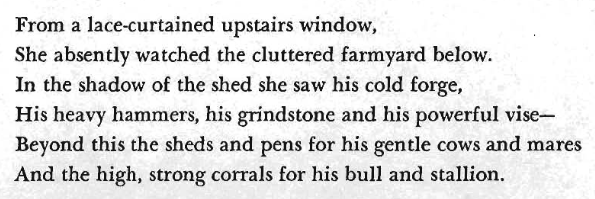Articles/Essays – Volume 03, No. 4
The Unhobbled Mare
From a lace-curtained upstairs window,
She absently watched the cluttered farmyard below.
In the shadow of the shed she saw his cold forge,
His heavy hammers, his grindstone and his powerful vise—
Beyond this the sheds and pens for his gentle cows and mares
And the high, strong corrals for his bull and stallion.
Her husband appeared around the corner of the barn,
Pumped water over his hands at the horse trough,
Splashed his face and wiped his mouth
On the rough cloth of his sleeve.
Seeing him, her shoulders drooped a bit more,
And she tried to bite loose a small hangnail
From a hand made rough with scrubbing floors.
She turned to descend the stairs reluctantly, but stopped
To straighten a milk-glass vase on a small mahogany table.
He stood in his boots on her kitchen floor,
Smelling of soil, horsesweat, silage and sour milk.
His hands reached for her as she passed.
She quickly turned toward the icebox,
Making it seem her first destination.
Efficiently, she laid a proper supper on the table.
He ate quickly, as one long starved, and
As he finished her competent blueberry pie,
Pushed back and picked a reluctant bit of meat
From his teeth with his longbladed stock knife.
She cleared the dishes from the table
And when her hands were deep in dishsuds
Felt his heavy arms encircle from behind
His breath in her tight-braided hair.
“Don’t” she said, “Why must you always do that?”
He backed away. “Ellie, why don’t you?”
He started to say. Then left it.
Not looking at his eyes with their half anger, half hurt,
And knowing what he wanted to say,
But had left unsaid, she left it unanswered.
Perhaps it could be avoided and eventually die.
Her only hope was to borrow strength from tomorrow,
When perhaps—but no he could never know,
And if he didn’t know, he could not be told.
He knew his livestock, but all he knew of women
Was what he learned from the Holy Bible
And the Sears Roebuck Catalog.
Not like Arnold who had courted her
With poetry and praise—who once had bared
Her shoulder and gently kissed her milk-white skin,
And she’d wept in delight—or even like Jed
Who had carried her across a stream then clear
To the top of the hill for a picnic, laughing confidently
At his own strength and youth and her susceptibility.
He broke the silence, starting for the door,
Saying he had to bed down the stock,
That he would probably sleep in the barn that night—
The bay mare was due to foal, and might need help.
So he went out, and she breathed again.
Outside he clenched his jaws
And banged his fist into the granary door,
Savoring the pain.
Must it always be so with women to invert
The Golden Rule and return love with hate?
While he was horny as Jim Marshall’s stud horse
That, kept in the barn, could smell the mares pass
In the lane, neighing high and long and
Stamping the wooden floor, until, they say,
He found a knothole he could see through,
And went cross-eyed trying to see
With both eyes at once.
He remembered old Padriac, the Army Remount stud.
They’d brought a mare to him, but not hobbled,
As regulations required.
And at the crucial, vulnerable moment,
She kicked with both hind feet.
And Padriac had died.
The man hit the wall again saying,
“The poor son of a bitch, the poor son of a bitch.”


 Back to full Issue
Back to full Issue

